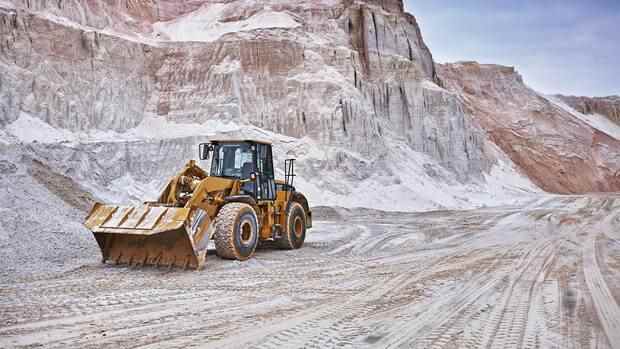The extraction of domestic raw material deposits is made more difficult by lengthy approval procedures. Kaolin is used to make paper and porcelain.
(Photo: imago/imagebroker)
Berlin According to the Federation of German Industries (BDI), strengthening domestic raw material production could significantly reduce Germany’s dependence on imports. In addition to the import and recycling of raw materials, “domestic raw materials make a significant contribution to achieving political and social sustainability goals,” according to an unpublished position paper by the association on raw materials policy.
Every tonne of domestic mining is a contribution to climate and environmental protection, “since hardly any other country in the world produces with comparable standards and framework conditions”.
Contrary to popular belief, Germany is not poor in raw materials in every respect. For example, according to the Federal Institute for Geosciences and Natural Resources (BGR), Germany is a major producer of all construction raw materials – clay, sand, gravel, chippings, gypsum, as well as limestone and marlstone for cement production – is independent of imports and has extensive reserves.
Some industrial minerals, such as rock and potash salt, kaolin, feldspar, fluorspar and barite, graphite and all quartz raw materials, are also found in Germany, are mined and some of them are sufficient to cover their own needs. The BDI rounds off the list in its position paper with a reference to domestic natural gas, which “will remain relevant for the secure energy supply in Germany as an affordable energy source for many years to come”, and to domestic lignite.
Top jobs of the day
Find the best jobs now and
be notified by email.
In view of the tense situation on the natural gas market, there has been a debate over the past few weeks about expanding production, especially when it comes to natural gas. In the meantime, there is also a debate about using the controversial fracking method for gas extraction.
In practice, according to the observation of the BDI, there are considerable obstacles to the extraction of raw materials. In view of the emerging global increase in demand for raw materials, the BDI calls for suitable framework conditions to be created immediately in order to be able to counteract supply bottlenecks and massive price increases as far as possible.
Politics should also ensure social acceptance
The recommendations for action include strengthening the acceptance of domestic raw material extraction through political support. The domestic extraction of raw materials is more than ever subject to social approval. Politicians must promote social acceptance through information and educational measures. “Similar to wind power, incentives should be created for the municipalities to support the extraction of raw materials in a positive way,” says the BDI recommendation.
In addition, planning must be accelerated: the regulatory hurdles, the high level of bureaucracy and the planning process that lasts for years mean a significant competitive disadvantage for German companies. The measures aimed at speeding up planning in connection with the energy transition should therefore “imperatively also be applied without restriction to the domestic raw materials industry”. The areas required for the extraction of raw materials would have to be secured in the long term and independently of current needs; they may not be planned or used for other purposes.
More: Energy transition in Chinese hands – Germany’s dangerous dependence on raw materials
